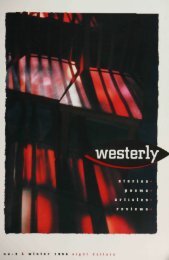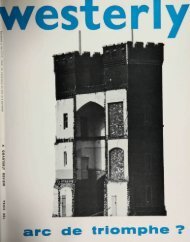Guerilla Poetry: Lionel Fogarty's Response to Language ... - Westerly
Guerilla Poetry: Lionel Fogarty's Response to Language ... - Westerly
Guerilla Poetry: Lionel Fogarty's Response to Language ... - Westerly
You also want an ePaper? Increase the reach of your titles
YUMPU automatically turns print PDFs into web optimized ePapers that Google loves.
three volumes of verse, only one of which has been published by anestablishment publisher, Penguin Books, who may have taken the opportunity<strong>to</strong> make a quick profit from the Brisbane Games and Aboriginal Protests of1982.<strong>Lionel</strong>'s poetry has a sweep of style and a breadth of content which no otherpoet in Australia can match. His style is all his own and sometimes he writesin a simple style akin <strong>to</strong> the poems of Jack Davis and Kath Walker, and thesepoems are open in meaning and sentiment <strong>to</strong> all, but especially in his laterpoetry, he excels as a guerilla poet wielding the language of the invader in anurge <strong>to</strong> destroy that imposition and recreate a new language freed of restrictionsand erupting a multi-meaning of ambiguity which hints at the many possibilitiesof meaning in a feeling language freed from the intellectual dreariness ofacademic verse. In fact his use of language as a vehicle for feeling reminds usof the Indian theory of Rasa rather than the dried out theories of the head peoplewho demolish poetry in their quest for intellectual understanding and not heartunderstanding.We sharing children, visit near mockingled fresh country <strong>to</strong>wn.Sentencing narcotic evil spit.Wristed excellence, disbelief clouded quickly in mudSandflies bleed, corroborees unknowing bluegumeven sunrise cries.Digging naked skulls sneaked along, so no greedy vic<strong>to</strong>riesBlackboy sided of a hillwomen bad placed, cause him say bones wrongBitumen cursed, dated gloom, supremed over a dream.(By Accident, Blinked, 1983:38)When we read verses of <strong>Lionel</strong>'s like the above, we appear <strong>to</strong> be in the presenceof an anti-language which may appear meaningless if we seek for intellectualunderstanding, and fail <strong>to</strong> understand that we are confronted by groups offeeling-images rooted deep within the Aboriginal psyche and experience. Andwe may well be in the presence of an anti-poetry, a turning away of all thatthe critics hold dear, and in which even the rhythms are flattened out, sometimeschanged abruptly, often discarded so that no sweet vic<strong>to</strong>ry is held out <strong>to</strong> enticethe reader who must grasp an entirety of feeling structure beyond dictionarymeaning. Yury Lootman writes about the artistic text thus: 'The presence ofat least two belletristic languages which decipher a single work of art and theresulting semantic tension (whose sharpness stems from the bifurcation of thesingle unified text that underlines it) constitute the minimal condition forregarding a text as artistic. A single text interpretable by two modes is seenas not being equal <strong>to</strong> itself and its two meanings become poles of conflict.However, in an actual work of art, we find, as a rule, a more complex pluralisticparadigm of codes giving life <strong>to</strong> the text via the "interplay" of numerousmeanings. Thus the relationship of text and system in an artistic work is notthe au<strong>to</strong>matic realization of an abstract structure in concrete form, but is alwaysWESTERLY. No.3, SEPTEMBER, 1986 53
a relationship of struggle, tension, and conflict.' (1976:123/4) Lootman'sexamples explaining his words relate <strong>to</strong> quite conventional literary modelsfound in European poetry; but the point he makes about the interplay ofnumerous meanings in a relationship of struggle, tension and conflict fits<strong>Lionel</strong>'s verses, though what are we <strong>to</strong> make of those verses where non-meaningerupts <strong>to</strong> disrupt the text. The last part of By Accident. Blinked are four linesof reasonably conventional verse pattern:Memory foolish fantasyflecks heartache cheatingour hatch mortality, freedoms in upliftand indigenous.It is easy <strong>to</strong> follow until we reach our hatch mortality and then we hesitate,for it is extremely difficult <strong>to</strong> place hatch in a conventional intellectual meaningframe in the verse. Does it mean hatch, as <strong>to</strong> hatch an egg? Does it mean hatch,as in a cover? Or does it mean none of these, and do we have <strong>to</strong> ascribe a meaning<strong>to</strong> hatch at all? We have <strong>to</strong> keep all these in mind when we confront <strong>Lionel</strong>'spoetry, and we must keep in mind Lootman's conclusions <strong>to</strong> his analysis ofthe poetic text: 'Poetic structure is a supple and complexly constituted artisticmechanism. In it the diverse possibilities for the s<strong>to</strong>rage and transmission ofinformation attain such complexity and perfection that nothing else created bythe hand of man can compare with it ... Insofar as that which is accidentalfor one substructure is systemic for another, (poetic structure) can be bothsystemic and simultaneously non-predictable so that practically inexhaustibleinformational possibilities are created. Simultaneously the poetic world is amodel of the real world but is correlated with it in an exceedingly complexfashion. The poetic text is a powerful and deeply dialectal mechanism of thesearch for truth, for understanding the surrounding world and our orientationin it.' (ihid .• p. 132)<strong>Lionel</strong>'s poems are exceedingly complex and far from those nineteenthcentury European models said <strong>to</strong> be favoured by other Aboriginal poets. Infact so far is he from them, that there is sometimes the danger of falling overthe edge of structure and the unity (in opposition or otherwise) which structureimplies in<strong>to</strong> what Levin (1973:59) calls 'a mere aggregation of words', thoughwith <strong>Lionel</strong> it is different in that he is attempting <strong>to</strong> push meaning and at leastthe structure of the English language <strong>to</strong>wards an absolute end and liberate hislanguage from that cultural imperialism of the spirit imposed on him atCherbourg. He is aware that the English language in which he writes is notreally his own, but a thing apart from him, but the feeling is his as are theAboriginal words scattered throughout his texts which reveal that here is noGubba writing, but a Murri able <strong>to</strong> use the language of the oppressor as aweapon captured from the enemy. He is Fanon's native, but he has not beenassimilated in<strong>to</strong> the language of the coloniser, but has captured it in a guerillaaction and made it over in<strong>to</strong> a free zone of the Aboriginal spirit.54 WESTERLY, No.3, SEPTEMBER, 1986







